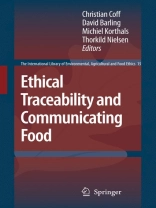The theme of this book evolved from the idea of linking three concepts around food: traceability, ethics and informed choice. We believe that the current devel- ment and implementation of traceability in the agri-food sector offers an interesting way not only of handling food safety but also of addressing and communicating ethical issues arising from current food production practices. Practices in the agri-food sector worry food consumers (as we all are, since we need to eat and drink to stay alive). But how can consumers act upon their concerns? Paradoxically, although consumers are bombarded with information on food – from the media, the food industry, food authorities, NGOs and interest groups – details about how foods are actually produced is often hard to find. Much of the infor- tion available is superficial, conflicting or partial, and it is hard for consumers seeking to mak e informed food choices to know which information to trust. The consumers we interviewed for this project felt that information about food products was withheld and manipulated. Traceability, which provides a record of the history and journey of a given food, and which is increasingly used in the food sector for legal and commercial reasons, has the potential to communicate a more authentic picture of how food is produced.
Inhoudsopgave
Regulation, Governance and Narrative Strategies of Food Traceability.- Ethical Traceability and Informed Food Choice.- The European Union and the Regulation of Food Traceability: From Risk Management to Informed Choice?.- Governing and Governance in the Agri-Food Sector and Traceability.- Narrative Strategies in Food Advertising.- Ethical Traceability in Three Food Supply Chains: Case Studies of Danish Bacon, UK Wheat-Bread and Greek Olive Oil.- Ethical Traceability in the Bacon Supply Chain.- Ethical Traceability in the UK Wheat-Flour-Bread Chain.- Traceability and Ethical Traceability in the Greek Olive Oil Chain.- Ethical Traceability and its Philosophical Implications for Civil Society, Market, State and Democracy.- Challenges of Ethical Traceability to the Public-Private Divide.- Traceability of Animal Welfare: Market or State, Good or Right?.- Consumer Rights to Food Ethical Traceability.- Ethical Traceability and Ethical Room for Manoeuvre.- Interpreting Traceability: Improving the Democratic Quality of Traceability.- Conclusions and Outlook.- Communicating Ethical Traceability.- Conclusions and Policy Options.












